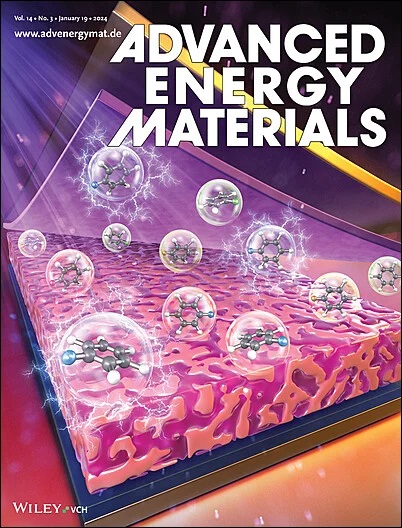Innovative Approach to Recycle Lithium-Ion Battery Electrolytes via Sequential Chemical Processes
IF 24.4
1区 材料科学
Q1 CHEMISTRY, PHYSICAL
引用次数: 0
Abstract
The rapid growth of electric vehicles (EV) has driven the widespread use of lithium-ion batteries (LIBs). This will result in a large amount of spent batteries that if not properly disposed will pose significant environmental damage, especially from the electrolyte. The electrolyte contains lithium hexafluorophosphate (LiPF6), which when treated by either incineration or water washing can generate harmful F- and P-containing substances such as hydrofluoric acid (HF). In this study, an innovative two-step process is presented to separate and purify both the solvents and lithium salts from the spent electrolyte. Antisolvent assisted precipitation is used to selectively isolate LiPF6 salt in the form of a complex with ethylene carbonate. Subsequent distillation then separates the volatile electrolyte solvents and antisolvent from each other effectively. In addition, a new process to further purify LiPF6 from its ethylene carbonate (EC) complex is also presented. This electrolyte recycling method not only enables the recovery of the high-value LiPF6 salt and the electrolyte solvents, but also paves the way for environmentally responsible and circular LIB recycling.

通过顺序化学过程回收锂离子电池电解质的创新方法
电动汽车(EV)的快速发展推动了锂离子电池(lib)的广泛使用。这将导致大量的废电池,如果处理不当,将造成严重的环境破坏,特别是来自电解液。电解液含有六氟磷酸锂(LiPF6),通过焚烧或水洗处理可产生有害的含氟和含磷物质,如氢氟酸(HF)。在这项研究中,提出了一种创新的两步法,从废电解质中分离和纯化溶剂和锂盐。用反溶剂辅助沉淀法选择性地分离了与碳酸乙烯配合物形式的LiPF6盐。随后的蒸馏将挥发性电解质溶剂和反溶剂有效地相互分离。此外,还提出了一种从其碳酸乙烯配合物中进一步提纯LiPF6的新工艺。这种电解质回收方法不仅可以回收高价值的LiPF6盐和电解质溶剂,而且为环保和循环利用LIB铺平了道路。
本文章由计算机程序翻译,如有差异,请以英文原文为准。
求助全文
约1分钟内获得全文
求助全文
来源期刊

Advanced Energy Materials
CHEMISTRY, PHYSICAL-ENERGY & FUELS
CiteScore
41.90
自引率
4.00%
发文量
889
审稿时长
1.4 months
期刊介绍:
Established in 2011, Advanced Energy Materials is an international, interdisciplinary, English-language journal that focuses on materials used in energy harvesting, conversion, and storage. It is regarded as a top-quality journal alongside Advanced Materials, Advanced Functional Materials, and Small.
With a 2022 Impact Factor of 27.8, Advanced Energy Materials is considered a prime source for the best energy-related research. The journal covers a wide range of topics in energy-related research, including organic and inorganic photovoltaics, batteries and supercapacitors, fuel cells, hydrogen generation and storage, thermoelectrics, water splitting and photocatalysis, solar fuels and thermosolar power, magnetocalorics, and piezoelectronics.
The readership of Advanced Energy Materials includes materials scientists, chemists, physicists, and engineers in both academia and industry. The journal is indexed in various databases and collections, such as Advanced Technologies & Aerospace Database, FIZ Karlsruhe, INSPEC (IET), Science Citation Index Expanded, Technology Collection, and Web of Science, among others.
 求助内容:
求助内容: 应助结果提醒方式:
应助结果提醒方式:


